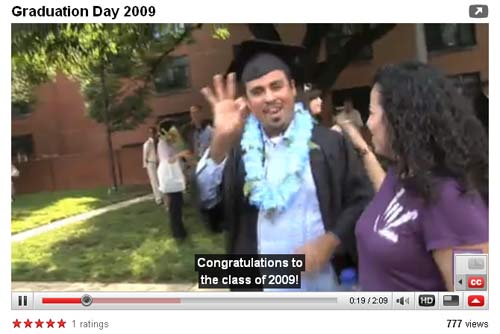Two days ago, I had the chance to attend the rehearsal of the webinar Glenda Sims will present on September 16: ADA-Compliant Web Videos 101: How to produce and publish online videos accessible to people with disabilities
Glenda is a true accessibility champion. Her presentation does a great job at providing the reasons why accessible online videos are important and how easy it can be to provide closed captioning.
Lately, I’ve been browsing some of the YouTube channels listed on the YouTube EDU portal, and out of the 40 I’ve reviewed up until now, only 2 or 3 offer videos with closed captioning.
It looks like closed captioning isn’t very high on the priority list of higher ed institutions with a presence on YouTube.
And, then I found this video from Gallaudet University, Graduation Day 2009.
Please just take 2 minutes to watch it to find out how closed captioning can make a big difference in online videos:
So?
Did you understand a thing of what was said?
Probably not unless you’re fluent in sign language.
Now, watch it again but don’t forget to turn on closed captioning (CC) as shown on the screenshot below – on the bottom left right side of the YouTube browser.
Makes a huge difference, doesn’t it?
Well, the difference will be the same when people who are deaf, not very fluent in English or in a very noisy (or too quiet to turn the audio on) environment watch your own videos — with closed captioning that is.
Do YOU provide closed captioning? Why? Why not?





We recently used DotSub to caption a video that we show to incoming students during orientation.
The cool thing that occurred after we (the college that I work for at OSU) captioned our video, and showed how easy it is to provide captioning, was that the main OSU YouTube account released the first OSU captioned YouTube video.
[…] http://collegewebeditor.com/blog/index.php/archives/2009/09/03/find-out-how-closed-captioning-can-m… a few seconds ago from web […]
An excellent illustration of a very important point.
I am finding the same thing here in the UK. Higher education institutions which could and should be using captions to reach new audiences somehow haven’t started doing much about it yet.
The first university to institute a blanket captioning policy on all its video content will pull off a huge media coup. I hope someone realises this soon and really starts the ball rolling.
Glad to see more colleges focusing on adding captioning to videos. To read a wider audience of people with disabilities, be sure to include transcripts with captioned videos.
I look forward to the day where I can access the majority of videos on the web instead of the minority. :)
[…] blog entry with a video from a graduation at Galluadet University shows how captions make a difference. I felt exactly like […]
[…] a start, I want you to go and read about why closed captioning makes a big difference to online video. Go read it now, and then come […]
It’s great to see more higher education institutions making efforts to make their audio media captioned. I was giving presentations at several higher education web conferences about the importance of captioning for audio media, and I was glad to find out that more and more colleges are taking this issue seriously.
By the way, there are also great examples of captioning and transcripts on RIT (Rochester Institute of Technology) and Stanford University websites.
The video you have embedded here actually subtitles ASL; it isn’t “captionedâ€Â per se.
Nice article and great illustration. For educational videos, it is 100% necessary to be able to reach ALL students and show accessibility for all… Even for other types of video captioning/subtitling can actually prove beneficial to the video producer’s bottom line.
[…] wrote this column a couple of months ago, after writing this post on how closed captioning can make a big difference but long before YouTube made an important announcement about new features using speech recognition […]
Hi all,
I’ve been using the 22frames.com resource ( http://www.22frames.com/ ) for a while. If you have trouble finding captioned videos from Youtube and other sites, perhaps check that out. I’m hooked on their homepage.
You can read more here: http://www.22frames.com/aboutus.aspx